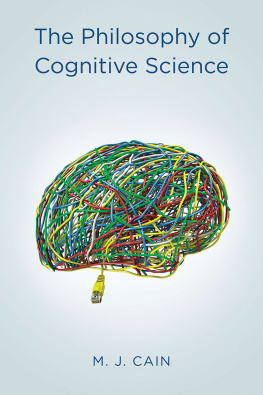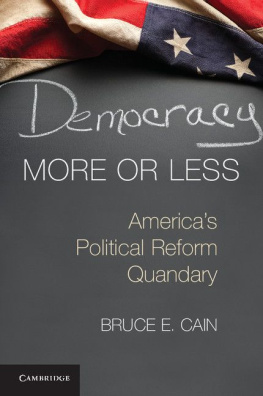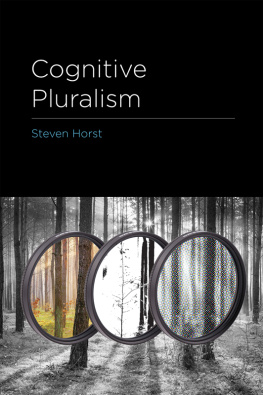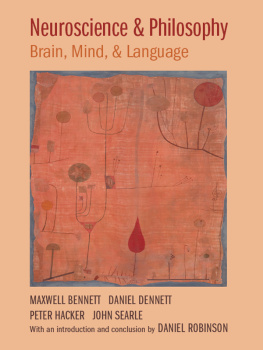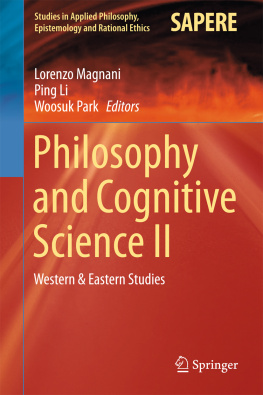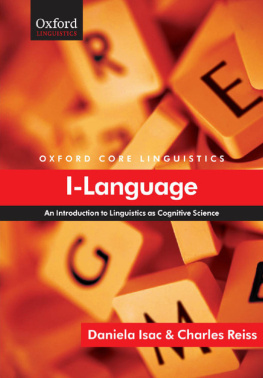Contents
Guide
Print Page Numbers

To Julie, Maya and Theo
The Philosophy of Cognitive Science
M. J. CAIN
polity
Copyright M. J. Cain 2016
The right of M. J. Cain to be identified as Author of this Work has been asserted in accordance with the UK Copyright, Designs and Patents Act 1988.
First published in 2016 by Polity Press
Polity Press
65 Bridge Street
Cambridge CB2 1UR, UK
Polity Press
350 Main Street
Malden, MA 02148, USA
All rights reserved. Except for the quotation of short passages for the purpose of criticism and review, no part of this publication may be reproduced, stored in a retrieval system, or transmitted, in any form or by any means, electronic, mechanical, photocopying, recording or otherwise, without the prior permission of the publisher.
ISBN-13: 978-1-5095-0205-9
A catalogue record for this book is available from the British Library.
Library of Congress Cataloging-in-Publication Data
Cain, M. J.
The philosophy of cognitive science / Mark Cain.
pages cm
Includes bibliographical references and index.
ISBN 978-0-7456-4656-5 (hardcover : alk. paper) -- ISBN 0-7456-4656-5 (hardcover : alk. paper) -- ISBN 978-0-7456-4657-2 (pbk. : alk. paper) -- ISBN 0-7456-4657-3 (pbk. : alk. paper) 1. Philosophy and cognitive science. 2. Philosophy of mind. I. Title.
BD418.3.C34 2015
128.2--dc23
2015008643
The publisher has used its best endeavours to ensure that the URLs for external websites referred to in this book are correct and active at the time of going to press. However, the publisher has no responsibility for the websites and can make no guarantee that a site will remain live or that the content is or will remain appropriate.
Every effort has been made to trace all copyright holders, but if any have been inadvertently overlooked the publisher will be pleased to include any necessary credits in any subsequent reprint or edition.
For further information on Polity, visit our website: politybooks.com
Acknowledgements
Writing this book has taken much longer than I anticipated when I first sketched its outline several more years ago than I care to dwell upon. I therefore need to thank my editors Emma Hutchinson and Pascal Porcheron at Polity for their continued patience, support and encouragement. Thanks also to my philosophy colleagues at Oxford Brookes University, Steve Boulter, Constantine Sandis, Dan OBrien and Bev Clack. Rumour has it that they find many of my philosophical views slightly bonkers, but that hasnt stopped them providing a warm and stimulating environment to work in. Ive also had the pleasure of supervising the PhD research of Dana Vilistere, Annie Webster, Marcus Westberg, Andrew McIntyre, Colin Beckley, Linda Fisher-Hoyrem, Esther Shallan and Istvan Zardai, all of whom have provided very helpful feedback on my developing ideas. Massive thanks to my daughter Maya Reid-Cain for helping me wrestle with the various diagrams used in this book and for keeping her disdain at my IT ineptitude in check. Most of all thanks to my wife Julie and children Maya and Theo for all their love and support. This book is dedicated to them.
Cognitive Science and the Philosophy of Cognitive Science
1 Introduction
This is a book about the philosophy of cognitive science. That topic immediately raises two questions: what is cognitive science and what is the philosophy of cognitive science? In one respect the answers to these questions are obvious: cognitive science is the scientific study of cognition, and the philosophy of cognitive science is that branch of philosophy that addresses philosophical questions generated by the scientific study of cognition. But these answers are hardly illuminating as they raise a number of subsidiary questions. What is cognition? What are the key assumptions and methods adopted by those who attempt to study cognition scientifically? How does cognitive science relate both to other sciences and to our commonsense understanding of ourselves as minded agents? When and how did cognitive science emerge as a distinct discipline? How does the philosophy of cognitive science relate to other branches of philosophy such as the philosophy of mind and the philosophy of science? In this chapter I will address these general questions and so provide the foundations for the more specific discussions of the later chapters.
2 Cognition
What exactly is cognition? In order to answer this question it is helpful to begin from a commonsense perspective. According to commonsense or at least the commonsense perspective of most twenty-first-century Westerners human beings can be distinguished from inanimate physical objects in having a mind. What, according to commonsense, is involved in our having minds? Here is a by no means exhaustive list: we think; we perceive the external world by means of our senses; we experience pain and other sensations when our bodies are appropriately stimulated; we experience moods such as depression and light-heartedness; we experience emotions such as anger, joy and jealousy; we are conscious both that we think and feel and how we specifically think and feel; we act on the basis of our decisions and intentions, which in turn often reflect how we perceive the world to be, what we think and what we want; when we act we are conscious of what we do without having to rely on our external sense organs; we recollect our past thoughts, actions and experiences; we imagine particular scenarios; and so on.
In so describing the activities that are central to human mentality from the commonsense perspective I did not use the term cognition. But if one were to ask which of the above activities were best described as involving cognition, most people would answer thinking. So one might say that, to a first approximation, cognition is thinking. But what exactly is thinking? Thinking is a mental process or activity that results in having a thought. Such thought processes range from the intellectually demanding and abstruse (as when one thinks when doing philosophy) to the banal and everyday (as when I address the question of whether I have enough time before my next lecture to buy a coffee). Some concern matters of great importance, others not. Some issue in thoughts that have an immediate impact on action and others dont. Some issue in thoughts that become deeply entrenched and influence many subsequent thought processes, while others issue in thoughts that are fleeting and inconsequential. Some concern counterfactual or hypothetical matters (would I have been late for my lecture had I queued for a coffee?) whereas others are straightforwardly factual.
If thinking is a mental process that issues in a thought, then what exactly is a thought? In everyday talk the term thought is most commonly used to refer to the mental state of considering a particular hypothesis or answer to a question or that of committing oneself to a particular hypothesis or answer. Such mental states are, or are closely related to, beliefs. For when one considers a particular answer to a given question one is paving the way to holding a particular belief, and when one commits oneself to a particular answer one has thereby acquired a belief. Beliefs are examples of what philosophers call propositional attitudes, as believing that p involves adopting the belief attitude to the proposition p. But there are propositional attitudes that are not beliefs, for, just as one can believe that p, one can desire that p, intend (to make it the case) that p, hope that p, fear that p, expect that p, and so on. Consequently, although it slightly strains everyday usage, one might say that thoughts are propositional attitudes, so that thinking is the mental process that results in the acquisition of a propositional attitude, be it a belief, a desire, an intention, or whatever.

